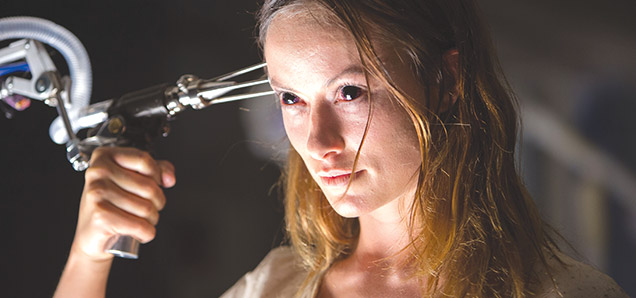What would you risk to bring back someone you love?
 CREDIT: BACK TO LIFE PRODUCTIONS, LLC
CREDIT: BACK TO LIFE PRODUCTIONS, LLCOlivia Wilde stars in The Lazarus Effect, in which she stretches her acting chops by flip-flopping personas with ease.
Medical sciences have come a long way in recent years. Those once doomed to die quickly can now live for years with proper care and treatment. Many diseases, which were once fatal, are now mere inconveniences, and some have been almost completely eradicated. With the advances we’ve made, where do we stop? If we had the power to bring back those we loved, would we use it? Should we use it?
These are the questions explored by The Lazarus Effect, a movie that blurs the line between scientific theory and religious argument. In the basement of a university, a group of medical students have uncovered the secret to bringing back the dead. However, all things come with a cost, and this price is higher than anyone could have imagined.
The movie features an all-star cast, although many are far from the roles we’ve seen them in previously. Both Mark Duplass (who plays Frank) and Donald Glover (as Niko) are better known for their work in comedies, and Sarah Bolger (as the documentary filmmaker Eva) has mostly been in princess roles, such as in The Tudors. However, despite being far outside of their normal castings, all of the actors do an amazing job, showing great emotional range. Olivia Wilde (as the main character Zoe) is especially fantastic as she flips from one persona to the next with barely a pause.
As a horror movie, The Lazarus Effect puts on a good show, with a mix of tension-building scenes and jump frights that keep the audience at a heightened state. The pace may feel a bit slow to start, but none of the scenes feel unnecessary or dull. Once the climax of the film begins, the pace picks up and continues to work well to the end of the film. There are a few horror movie tropes that could have been avoided – such as the creepy little girl seen in every scary movie ever made – but even that had a purpose in the larger plot, so it can be forgiven.
One of the problems the movie does have is its attempt to be palatable to both religious and nonreligious viewers. Scientific explanations are given alongside theological ones. While the dialogue is well written, this mix still feels awkward, especially given the context of the setting – these are all highly educated, scientific minds in a university research facility. A love triangle also gets shoehorned in, possibly to add conflict and develop the characters, but it really doesn’t do much for the story.
Despite the occasional cheesiness of the film, The Lazarus Effect does a great job of showing the boundary between science and theology, blurring that line and making us question how far our push to everlasting life should go. The movie asks some difficult questions about the nature of life, hell, the soul and death. We are reminded of Ian Malcolm’s famous line in Jurassic Park, “Your scientists were so preoccupied with whether or not they could that they didn’t stop to think if they should.”













